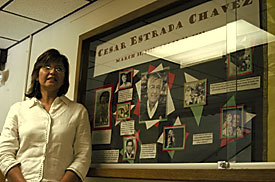 |
|
Joshua Sills/ Arizona Summer Wildcat
|
Socorro Carrizosa, director of the Chicano/Hispano Center, stands near a collage of Cesar Chavez photos and information inside the Economics building. The name of the Economics building will soon be changed to comemorate the pioneering farm worker.
|
|
By Aaron Mackey
Arizona Summer Wildcat
Wednesday July 9, 2003
One signature is all that remains before the Economics building will be renamed the Cesar E. Chavez building in honor of the Yuma-born farm labor organizer.
The renaming proposal was submitted to UA President Pete Likins last week after the Naming Advisory Committee passed it, according to committee chair Wanda Howell.
Likins, who had said earlier this year that he supported the idea, is expected to give the green light to the name change.
"I think it would be a good statement by the university to recognize the work of Cesar Chavez," he said in April. "He was an advocate of peaceful change, and I would have no problem with it."
Likins was out of town this week and was unavailable for comment.
Antonio Estrada, director of the Mexican-American Studies and Research Center, said he has worked closely on the proposal and was happy to see the measure succeed.
"Cesar Chavez has been a champion of the underprivileged, underserved, and the marginalized."
Estrada said that, given the fact that Chavez was born in Arizona as well as the growth of the Hispanic community in the region, such an honor was long overdue.
Chicano/Hispano Student Affairs director Socorro Carrizosa has also been pushing for the name change and said she was overwhelmed and shocked upon hearing of the proposal's passage.
"Knowing that this university is going to offer this kind of recognition to somebody that means so much to this community, I'm amazed. I'm so proud of this university, that it is willing to stand up and do something like this," she said.
Carrizosa said the name change would attract Hispanic students to the university and offer them a place to go and feel comfortable.
Mario Barragan, an undeclared sophomore, agreed.
"I think it's a good idea. There isn't any other building named after a Hispanic figure," he said.
The Economics building is home to the Mexican-American Studies and Research Center, Chicano/Hispano Student Affairs and the department of agricultural and resource economics.
The building also houses divisions of the mathematics department and the Economic Research Lab, and it contains classrooms used by various departments.
According to Howell, the proposal met some opposition when committee members said the name change was impractical because so many other departments reside within the building.
Members of the committee also pointed out that the Mexican-American Studies and Research Center as well as Chicano/Hispano Student Affairs could move into a building by themselves at some point in the future, Howell said.
At that point, the new building would be named the Cesar E. Chávez building, leaving the Economics building to be renamed once again.
"We would then have to go through the rigmarole all over again," Howell said.
However, Estrada said such a move is highly unlikely and far down the road, and that for the time being the name change was significant and necessary.
"Given the history and legacy of Cesar Chávez , it just makes sense," he said.
Carrizosa said that if such a move ever did happen, no future name change would be necessary, as the building, which holds a number of classrooms, would still represent the values that Chávez embodied.
"This is an integral building. This is a classroom building right at the center of the university," she said.
"It will pay tribute to Chávez, regardless if the center moves or not," Barragan said. "It's just for the sake of his honor, not just a symbol for the center."
One other concern that arose before naming committee members was the fact that Chávez did not have a direct connection with the UA.
The Martin Luther King Jr. building is the only building on campus to be named after a person who was not directly connected to the university.
"If one looks at his legacy, it's very clear that he deserves the same recognition as Martin Luther King Jr.," Estrada said.
Candace Carrasco, an incoming engineering freshman, said she was not familiar with Chávez 's work or ideals, but said that, as a new student at the university, seeing the building's new name would make her wonder about its namesake.
"He's not someone who donated a bunch of money," she said. "Because of that, I would want to know more about him. He's not just some person who donated a bunch of money to get their name on a building."
Although Chávez did not have a direct tie to the UA, Estrada said he was more than deserving of the honor, and that's part of the reason why he and Carrizosa have pushed for the name change for more than a year.
The proposal was originally submitted to the committee in early April, but was not approved because some departments in the building had yet to be contacted for input, Howell said.
"We had people in my subcommittee, who have offices in the building, who said they hadn't heard anything about it before now," she said in April.
However, both Estrada and Howell said that the situation had been remedied by the time the proposal came back before the committee last week.
According to university procedure, the criteria for naming a building are often based on financial contributions. However, others can be considered if the individual has made a significant contribution to the university or community in general.
"He's an individual that brought national and international attention, whether you were in agriculture or not," Carrizosa said. "His work had an impact on all of our lives."
ų Kristina Dunham contributed to this report.

